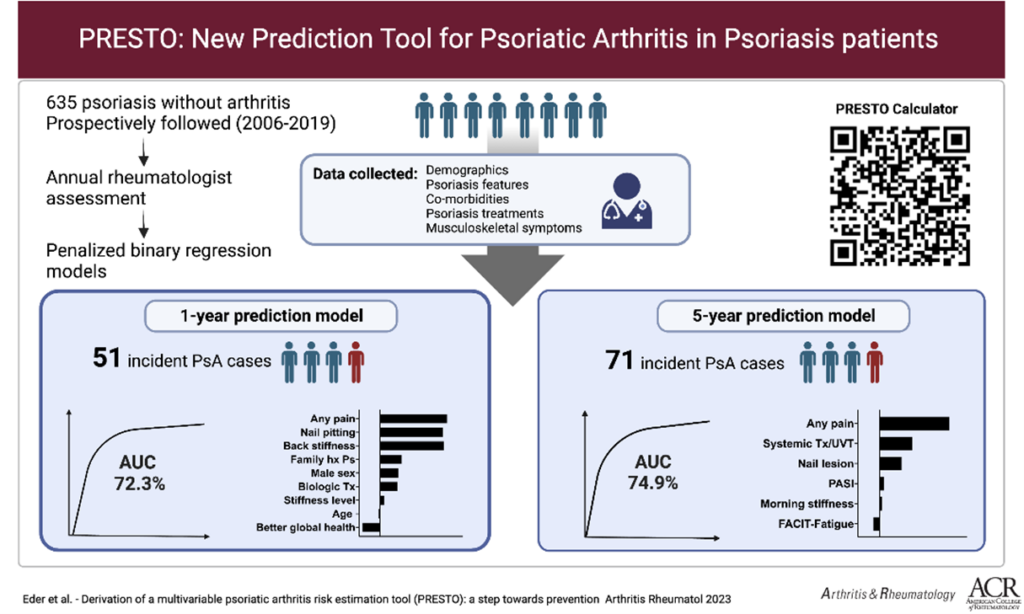
Psoriatic arthritis (PsA) is an inflammatory disease that affects the joints and muscles. In about 75 per cent of cases, PsA emerges after a person has been diagnosed with psoriasis, an autoimmune condition that causes inflammation in the skin, placing them in a high-risk category. This calls for a focus on early detection and prevention, which is why a team at Women’s College Hospital (WCH) developed PRESTO – the first tool of its kind to calculate the risk of psoriatic arthritis.
Their findings were published in Arthritis & Rheumatology titled, Derivation of a multivariable psoriatic arthritis risk estimation tool (PRESTO): a step towards prevention.
“The purpose of this study was to develop a tool that can accurately estimate the risk of a person with psoriasis developing PsA within the next one to five years,” says Dr. Lihi Eder, director of the psoriatic arthritis clinic at WCH and associate professor of medicine, University of Toronto, who led the study. “This is important because we have treatments now that can potentially delay progression to psoriatic arthritis in patients with psoriasis who are at high risk.”
PRESTO employs a mathematical formula to estimate the likelihood of developing PsA by leveraging several factors linked to a higher PsA risk including duration of psoriasis, family history, pain level, nail lesions and general muscle or joint symptoms.
“The focus was on evaluating factors that can be easily assessed during a clinic visit either through patient interviews or physical exams. Physicians can enter information about their patient, then the calculator provides the estimated risk or probability of developing psoriatic arthritis,” explains Dr. Eder. “We were able to develop this tool because we collaborated with Dr Dafna Gladman at Toronto Western Hospital, who created the first cohort of psoriasis patients under regular observation since 2006 and have maintained yearly follow-ups. Because we have this unique data, we could develop PRESTO.”
By using this tool, physicians can make a meaningful action plan for their patients who are at risk of developing PsA.
“People with psoriasis will start with dermatologists, who can then use this tool to calculate the risk and decide whether their patients need to be referred to rheumatologists for further assessment,” adds Dr. Eder. “The tool can also be used by rheumatologists. Based on the calculation, they can decide whether their patient needs early treatment, ongoing follow-ups, or can be safely discharged.”
This calculator also has the potential to enhance the efficacy of clinical trials.
“There is a lot of interest in rheumatology regarding preventive trials,” says Dr. Eder. “PRESTO allows accurate estimation of this risk which can enrich clinical trials that are trying to prevent the progression of arthritis.”
PRESTO is a significant stride towards improving early detection and could open doors for interventions at an early stage, potentially putting a stop to the progression from psoriasis to PsA. Thank you to Dr. Eder and team!
To access the PRESTO calculator, click here.
The PRESTO study was funded by a grant from PSI foundation. Dr Eder is supported by Canada Research Chair in Inflammatory Rheumatic Diseases (Tier 2). The University of Toronto Psoriasis cohort is supported by grants from the Krembil Foundation.